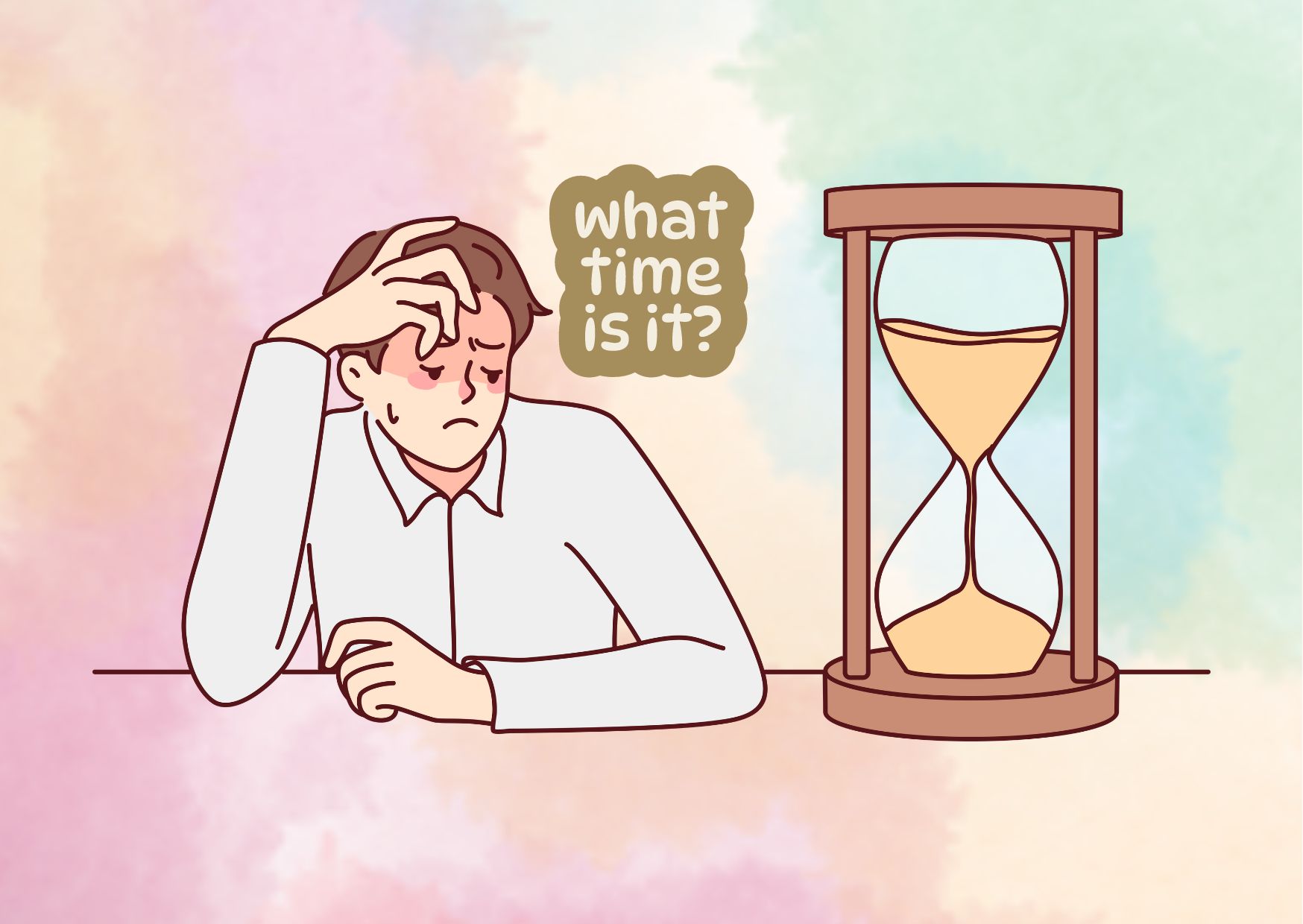Comprehensive Guide to Time Blindness
Time blindness, a common symptom of ADHD, is the inability to accurately perceive how much time has elapsed and estimate the duration required to complete tasks. It affects various aspects of time management, including estimation, sequencing, and reproduction. People with time blindness may struggle with chronic lateness, underestimating task durations, and adhering to schedules.
While time blindness is often associated with ADHD, it can also result from disruptions in dopamine signaling or lower activity in the prefrontal cortex and default mode network of the brain. This comprehensive guide delves into recognizing time blindness symptoms, its impact on routines and relationships, and effective strategies like reminders, time tracking techniques, and professional support options to manage this condition.
What Is Time Blindness?
Time blindness is a cognitive condition that impairs an individual’s ability to accurately perceive and estimate the passage of time. It is a common symptom associated with Attention Deficit Hyperactivity Disorder (ADHD) and Autism Spectrum Disorder (ASD). People with time blindness often struggle with punctuality, planning, and completing tasks within anticipated timeframes.
Neurological Underpinnings
The root cause of time blindness lies in the way the brain processes and perceives time. In individuals with ADHD or ASD, there may be disruptions in dopamine signalling or lower activity in the prefrontal cortex and default mode network, which are crucial for time perception and management. These neurological differences can lead to challenges in accurately estimating time horizons, sequencing events, and reproducing time intervals.
Manifestations of Time Blindness
Time blindness can manifest in various ways, including:
- Poor time estimation: Difficulty accurately judging how much time has elapsed or how long a task will take.
- Chronic lateness: Consistently arriving late for appointments, meetings, or events due to misjudging the required time.
- Procrastination: Delaying tasks or leaving them until the last minute due to a skewed perception of available time.
- Missed deadlines: Failing to complete assignments or projects within the allotted timeframe.
- Difficulty with transitions: Struggling to shift focus between tasks or activities due to a distorted sense of time.
- Feeling time is moving too quickly: Experiencing a sense that time is passing rapidly, even when engaged in routine activities.
- Impulsivity: Acting without considering the consequences or the time required for a particular action.
While time blindness is often associated with ADHD and ASD, it can also occur in individuals without these conditions, although to a lesser extent. Understanding and recognizing the manifestations of time blindness is crucial for developing effective strategies to manage this cognitive challenge.
The ADHD Brain and Time Blindness
The ADHD brain is wired differently, leading to challenges in time perception, time management, and time-related cognitive functions. This unique neurological wiring is characterized by lower activity levels in certain brain regions, particularly the prefrontal cortex and default mode network, as well as disruptions in dopamine signalling.
Neurological Factors
- Prefrontal Cortex and Default Mode Network: These brain regions play a crucial role in time perception and management. In individuals with ADHD, lower activity levels in these areas can contribute to difficulties in accurately estimating time horizons, sequencing events, and reproducing time intervals.
- Dopamine Dysregulation: Dopamine, a neurotransmitter involved in regulating attention, motivation, and reward processing, is often dysregulated in ADHD. Deficiencies in dopamine levels can impair the brain’s ability to passively interpret sensory cues related to time, leading to challenges in time perception and management.
- Emotional Stimuli and Time Perception: Interestingly, individuals with ADHD tend to perform better on time perception tasks that involve emotional stimuli compared to neutral tasks. This suggests that the ADHD brain may process time differently when emotional factors are involved.
Manifestations and Impacts
The neurological differences in the ADHD brain can manifest in various ways, including:
- Underestimating or overestimating the time required for tasks
- Chronic lateness and difficulty adhering to schedules
- Procrastination and leaving tasks until the last minute
- Losing track of time when hyperfocused on an activity
- Feeling like time is passing too quickly or too slowly
- Difficulty creating and following routines
These manifestations of time blindness can have significant impacts on relationships, work, and daily routines, leading to missed deadlines, rushed last-minute work, and strained interpersonal connections.
Understanding the neurological underpinnings of time blindness in ADHD is crucial for developing effective strategies and interventions to manage this cognitive challenge. By addressing the underlying neurological factors, individuals with ADHD can learn to better perceive and manage time, ultimately improving their overall functioning and quality of life.
Suggestion for read: Contradictory Cognitive Dissonance
Recognizing Time Blindness Symptoms
Time blindness manifests itself through various symptoms that can significantly impact an individual’s daily life, routines, and relationships. Here are some common signs and symptoms to watch out for:
Prevalent Symptoms
- Poor Time Estimation: Individuals with time blindness frequently underestimate or overestimate the time required for activities, leading to a skewed perception of task durations.
- Chronic Lateness: They often struggle with punctuality, consistently arriving late to appointments, meetings, or social gatherings due to misjudging the required time.
- Procrastination: Time blindness can contribute to procrastination, as individuals have difficulty gauging how much time is available, leading them to delay tasks until the last minute.
- Missed Deadlines: Tracking deadlines and schedules can be challenging, resulting in missed appointments, assignments, or other time-sensitive commitments.
- Difficulty with Transitions: Shifting focus or ending one task to start another can be a significant hurdle, as individuals may struggle to recognize when it’s appropriate to transition between activities.
- Feeling Time is Moving Too Quickly: Many individuals with time blindness experience a sensation that time is passing too quickly, leading to anxiety or stress.
- Difficulty Planning Ahead: Envisioning and preparing for future events or responsibilities can be problematic, as time blindness impairs the ability to conceptualize and plan for the future.
- Impulsivity: In some cases, time blindness can contribute to impulsive behaviors, as individuals may act without fully considering the long-term consequences or the time required for a particular action.
These symptoms can manifest in various aspects of life, including work, personal relationships, and daily routines, making it essential to recognize and address time blindness effectively.
Impact on Relationships and Routines
Time blindness can have a profound impact on relationships, daily routines, and work performance, leading to conflicts, missed deadlines, and rushed last-minute work. Here’s how this cognitive condition can affect various aspects of an individual’s life:
- Strained Relationships: Time blindness can damage relationships, as individuals may appear irresponsible or uncaring due to chronic lateness, missed commitments, or failure to prioritize important events. This can lead to conflicts, disappointment, and a lack of trust in personal and professional relationships.
- Disrupted Daily Routines: Establishing and adhering to daily routines can be challenging for those with time blindness. Simple tasks like getting ready for work, completing household chores, or following a schedule can become overwhelming, leading to disorganization and stress.
- Work Performance Challenges: In professional settings, time blindness can result in missed deadlines, rushed work, and a perception of unreliability. This can negatively impact career growth, job satisfaction, and overall productivity.

